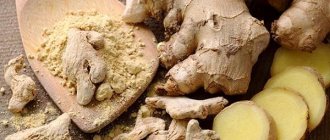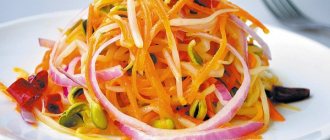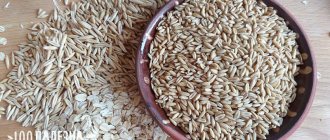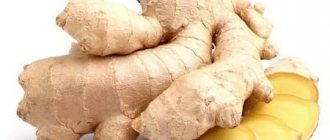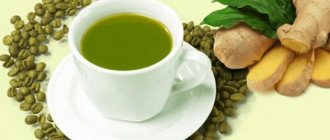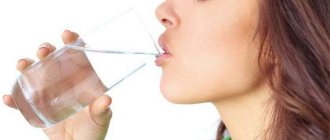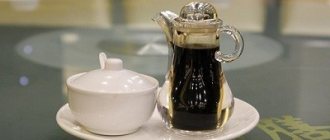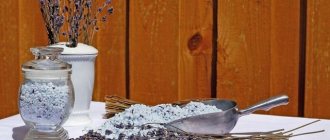Ginger root has been used since ancient times to reduce pain, relieve cold symptoms, and strengthen the body. In modern life, its benefits have become even more relevant: the root has a positive effect on the reproductive system, tones, and is successfully used when following a diet.
Its spicy aroma, warming effect, variety of uses and availability all year round make ginger an indispensable assistant in healing the body.
General information
Ginger is a herbaceous plant from the Zingiberaceae family. Southeast Asia is considered its homeland, and its amazing properties have been known to people for more than 5 thousand years. Grown mainly in Asian and warm countries - China, India, Australia and Indonesia.
The above-ground part of the plant resembles a reed: straight long stems up to 1.5 m tall with inflorescences in the form of spikelets, which can be brown, red or yellow. The rhizome consists of tubers with branches, covered with light gray dense skin.
The ginger found in stores is a mature root (harvested when the plant is 8-10 months old), the skin is light brown and the flesh is yellow. The tubers are large and the taste is more pungent. The value lies in the high oil content and juiciness.
Young ginger is collected when the plant is 3-4 months old, has a delicate pink shell and is consumed without peeling. The tubers have a minimal amount of fiber, which is more convenient for processing. For medicinal purposes, oil, dried root or tinctures based on it are often used. The spice is highly valued for its unique composition of beneficial elements.
Chemical composition
The presence of more than 400 useful elements was found in the tubers of the spicy plant.
Includes:
- important minerals: magnesium, calcium, phosphorus, manganese, silicon, zinc, potassium, chromium;
- vitamins: A, B1, B2, B3, C, E, K;
- amino acids: leucine, valine, isoleucine, threonine, lysine, methionine, phenylalanine, tryptophan;
- fatty acids: oleic, caprylic, linoleic acid;
- curcumin, which has immunomodulatory and analgesic properties;
- phellandrene, gingerol, camorene, borneol, citral;
- glucose and fiber.
The processing method affects the content of useful elements: heat treatment reduces their quantity.
Eating ginger raw will provide more benefits. 100 g of root contains 1.8 g of protein, 0.8 g of fat, 15.8 g of carbohydrates and 2 g of dietary fiber.
Pros and cons of using ginger
While ginger is certainly beneficial for healthy people, the use of this product for various diseases is a controversial issue. Let's evaluate the pros and cons of using ginger for various conditions of the body. But do not forget that the recommendations given below are general, and each person is individual. Therefore, you should consult your doctor before starting use.
For diabetes
Ginger can help with diabetes as this product has the ability to regulate blood sugar levels. Moreover, this ability has been confirmed by clinical trials. This spice can help patients suffering from type 2 diabetes. In the insulin-dependent form of the disease, herbal medicine is ineffective.
Ginger contains a component called gingerol. It has the unique ability to break down glucose without the participation of insulin. In addition, ginger has been confirmed to prevent the development of cataracts, a complication faced by most diabetics.
Ginger root has a low glycemic index, so it can be safely included in the diet of a diabetic patient. Of course, if there are no other contraindications.
For nursing mothers
Consuming ginger in limited quantities will be beneficial for breastfeeding women. Of course, you don’t need to start using this product immediately after the maternity hospital. It is recommended to wait until the baby is 3-4 months old. By this time, a healthy baby’s digestive system will become more advanced and the foods that the mother eats will have less of an impact on the child’s health.
Of course, individual characteristics must be taken into account. You can eat just a little ginger the first time, and then watch to see if your child has a negative reaction. But even if there were no consequences, you should not get carried away with consuming ginger during lactation.
Useful properties of ginger
The positive effect of the root on the human body is recognized not only in alternative medicine, but also in official medicine. To alleviate the condition, it is recommended by doctors of various specializations.
Regular use of the product:
- increases immunity;
- normalizes the process of food digestion, prevents flatulence and diarrhea, is effective for constipation;
- eliminates helminths;
- relieves nausea;
- increases body tone;
- fights inflammatory processes;
- has a positive effect on gums and teeth;
- accelerates blood circulation;
- normalizes blood cholesterol levels;
- improves the condition and functioning of the cardiovascular system;
- improves memory;
- has a positive effect on the condition of the skin;
- speeds up metabolism and helps in weight loss.
The spice has a general strengthening effect, is useful for chronic fatigue and helps to invigorate. Promotes recovery from stress and emotional turmoil.
One of the uses of ginger is the treatment of colds. The spice increases resistance to viruses and prevents the spread of infection throughout the body. Essential oils reduce inflammation in the throat. Thanks to its mucolytic properties, the product helps with all types of cough. Treatment of a runny nose is possible due to its bactericidal effect.
Ginger root will be useful for everyone with the following diseases:
- pathologies of the gastrointestinal tract (but in the stage of remission, not exacerbation);
- influenza, ARVI, sore throat;
- cough and bronchial asthma;
- diabetes mellitus and predisposition to it;
- diseases of the oral cavity;
- diseases of the joints and bones (rheumatism, arthritis, arthrosis);
- problems with blood vessels (varicose veins, atherosclerosis);
- headache;
- skin diseases associated with acne and increased oily skin;
- chronic problems with the liver and kidneys.
Ginger is beneficial for the male and female body in its own way.
Benefits of ginger for men
For the male half of humanity, the root is a natural stimulant of sexual activity. Spice increases potency, improves blood circulation and muscle tone.
For men, the root is useful for prostatitis due to its anti-inflammatory properties; consuming ginger reduces the risk of prostate diseases.
In athletes, the product accelerates the process of muscle tissue recovery and relieves inflammation during injuries.
Spice is also recommended for men for the following diseases:
- decreased potency;
- erectile disfunction;
- premature ejaculation;
- urological;
- arthritis, radiculitis;
- cardiovascular.
Let's take a closer look at how consuming ginger root helps in each case:
- Ginger is a source of manganese and zinc, which promote the production of testosterone (male sex hormone). Improving the functioning of the gonads, supplying blood to the genitals and increasing potency occurs due to the high content of vitamins B1, A and C.
- Increasing blood circulation and flow to the penis helps prevent erectile dysfunction and premature ejaculation.
- The bactericidal properties of ginger are used for chronic diseases of the genitourinary organs and exacerbations.
- The root will help eliminate pain from joint diseases (arthritis, radiculitis, arthrosis), and discomfort when walking. 60 g of fresh product per day is enough.
- Eating 2-3 pieces every day serves as a prevention of diseases of the cardiovascular system due to the content of vitamin B6, potassium, and magnesium in the root.
- To relieve a hangover, it is useful to chew a couple of slices of fresh root or drink ginger tea. By stimulating the stomach and eliminating intoxication, alcohol will be eliminated from the body faster.
Benefits of ginger for women
What is especially beneficial for women’s health is that consuming the root:
- removes toxins and waste;
- relieves pain during menstruation;
- increases libido;
- helps in the fight against excess weight;
- improves skin condition.
It is used for infertility, toxicosis, dysbacteriosis, thrombophlebitis, various infections, skin problems, pain and spasms during migraines, swelling.
In case of infertility, the root normalizes hormonal levels, restores the menstrual cycle, and improves the process of egg maturation. As a result, reproductive function is stabilized.
During menopause, the product acts as a sedative. After 45 years, it is useful for eliminating headaches and hormonal fluctuations.
During pregnancy, it is allowed to take only after the approval of a doctor, as it may increase the tone of the uterus. Eating ginger alleviates toxicosis, relieves increased irritability and fatigue, improves intestinal function, and relieves swelling.
For fibroids and uterine fibroids, ginger root is also often prescribed due to its anti-inflammatory effect. Strengthening the immune system prevents the appearance of new tumors.
To ensure that the product does not harm, but only benefits, it is important to consume the product within normal limits and use proven recipes.
Spice is no less useful for a child’s body than for an adult.
Useful properties for women
In addition to the general benefits of ginger for the human body, it also has certain properties that will be very useful specifically for the female sex. In addition to the fact that this plant helps in weight loss and removal of toxins from the body, it also relieves pain during menstruation. Also, in ancient times, ginger root was used as a medicinal drug for infertility, as it has a positive effect on the female organs. Interestingly, it helps women even after they become pregnant, since it relieves nausea during toxicosis. However, this is only relevant for the first trimester, after which ginger can be dangerous for the mother and her child, as it lowers blood pressure. The benefits of ginger root for the human body do not end there. It is also an excellent aphrodisiac that increases sexual desire. This happens due to the fact that more blood flows to the pelvic organs.
harm and benefits of ginger for humans
Is it possible to give ginger to children: at what age and in what form?
Thanks to its universal properties and multicomponent chemical composition, ginger root:
- strengthens the child’s immune system, warms and improves tone;
- improves metabolism and intestinal function;
- normalizes appetite;
- has an antihelminthic effect;
- for bruises it is used locally as a pain reliever;
- for colds with cough and runny nose, it has a diaphoretic effect, reduces inflammation, facilitates breathing and coughing.
The age at which ginger can be consumed by children is 2-3 years. Introducing it into the diet before this age will result in irritation of the immature digestive system and oral mucosa.
In general, warm ginger tea made from the fresh root is best for young children. Honey and lemon will add health and taste. All components of tea are potential allergens; it is better to consult a pediatrician.
Children are also given a decoction, the juice is used for inhalation and lollipops are made.
- Decoction. Cook the paste from a piece of ginger in 1 liter of water over low heat for 10 minutes. Then cool and add honey and lemon juice. Warm it up and give the child 100 ml three times a day.
- Juice. Give 1 teaspoon along with lemon juice and honey three times a day for irritation and sore throat. The mass needs to be absorbed.
- Inhalations. Both the root itself and essential oil are added to the inhalation composition. The procedure facilitates the progression of colds, the discharge of sputum and reduces the number of pathogenic bacteria in the nasopharynx.
- Lollipops. The squeezed juice from the root is mixed with melted sugar, you can add lemon or orange juice. Boil until the mass thickens, and then pour into silicone molds and insert toothpicks. The mass should harden.
Baking with ginger will also be beneficial; children will love it.
Ginger during pregnancy
A little higher, you learned that ginger is prohibited for expectant mothers, but only in a few situations. In the rest, consuming the root does not pose any threat; on the contrary, it is beneficial. For example, it will help relieve the expectant mother of toxicosis, dizziness, improve her mood and well-being, and increase her strength. In addition, a glass of ginger tea can calm frayed nerves. If you take ginger during pregnancy, then all the necessary vitamins and microelements will saturate both the mother and the unborn child.
Properties of pickled ginger
When pickled, the root loses its pungency and some of its calories. The benefits of the pickled product are slightly less due to the possible content of artificial additives, salt and sugar. Vinegar slightly destroys vitamins, but improves taste and increases the content of organic acids. Pickled pieces irritate the stomach and intestines less than fresh ones, are easier to digest and have a delicate structure.
Pickled ginger (Photo: blogspot.com)
It is important that more of the product can be consumed in marinated form, since it is used as a snack with main dishes or bread.
Beneficial properties of pickled root:
- increases gastric secretion and facilitates the digestion of protein dishes;
- good for the heart and blood vessels due to the presence of a large number of macroelements;
- anti-inflammatory, anti-aging and immunostimulating effects;
- cleanses and refreshes the oral cavity;
- reduces sugar and bad cholesterol levels.
When consuming pickled root, the body receives more minerals involved in the synthesis of cells and immunoglobulins.
At the initial stages, the pickled product helps fight pathogens, bacteria and viruses. There’s a reason they serve an appetizer with raw fish: the root, in combination with vinegar, eliminates infestation larvae and putrefactive bacteria.
Due to the vinegar and salt content, this product should be consumed in moderation, combined with foods containing fiber and having enveloping properties.
The norm for pickled ginger for an adult is a maximum of 50 g per day (with good tolerance - up to 100 g).
Consumption often and in unlimited quantities is undesirable; microelements may be supplied in excess quantities.
To eliminate possible disadvantages of a purchased pickled product, you can prepare it yourself.
TOP 17 beneficial properties of ginger
Ginger is famous not only for its taste and characteristic medicinal qualities. Its tuberous rhizomes store a whole storehouse of useful vitamins and elements, as well as amino acids that are essential for our body and unique organic compounds. This explains the number of useful properties and qualities:
- This plant is believed to help prevent cancer. This is facilitated by organic substances that help in the preventive fight against malignant formations in various organs: skin, mammary gland, colon, pancreas, skin, and so on. Numerous studies have proven that, indeed, gingerol, a substance found in ginger, has an anti-inflammatory effect, and therefore is able to prevent the development of antiogenic factors. As a result, cancer cells do not grow as actively and even die, without causing any “discomfort” to healthy cells. It is also important that with regular use, ginger reduces the effect of liver damage as part of the treatment of cancer with doxorubicin, and helps to organize the prevention of poisoning through toxic substances.
- The root is indispensable when it comes to maintaining healthy bones, joints, and relieving pain. The calcium in the composition works to strengthen, and gingerol does not give a chance to inflammation in the early stages, preventing the development of osteochondrosis and osteoarthritis.
- Excellent antifungal and antimicrobial properties. This is why ginger is so often used both as a supplement and sometimes as an alternative to a number of medicinal drugs; for example, it has shown to be better than antibiotics in killing Staphylococcus aureus. This should also include the diaphoretic action, which ultimately helps to cleanse skin pores, remove toxins from the body, and the presence of a natural antibiotic, dermicin, allows you to fight fungi and pathogens.
- Normalization of digestion, since ginger is also an antispasmodic that increases the active production of gastric juice. It stimulates digestive processes, helps digest proteins, and eliminates gastrointestinal disorders. The root contains compounds that promote the absorption of nutrients, so ginger is quite capable of acting as an aperitif. Gigerol reliably protects the gastric mucosa, creating a barrier to a wide range of infections, including one of the obvious causes of cancer, Helicobacter pylori, H. pylori strains, and so on.
- Reduced blood sugar levels. With regular use, ginger helps reduce protein in the urine, normalize diuresis, gastric function, blood circulation, strengthen the walls of blood vessels, coupled with getting rid of cholesterol plaques. The effect on blood sugar levels is obvious.
- Fighting neurodegenerative diseases. Curcumin, in tandem with hignerol, works to prevent the development and accumulation of amyloid plaques in the human brain, which are associated with Alzheimer's disease. Zingerone neutralizes peroxynitrite to protect cells in various neurodegenerative pathologies.
- Migraine treatment. This is possible due to its antispasmodic and anti-inflammatory properties that help reduce prostaglandin levels to relieve inflammation and pain.
- Toothache also loses ground under the influence of ginger, since the latter lowers the level of prostaglandids, which act as catalysts for pain with cramps and fever. In terms of quality, the pain-relieving effect of taking ginger is comparable to ibuprofen.
- Normalizes heart function, as this plant lowers cholesterol levels in the blood so that there is no accelerated blood clotting. This reduces the risk of blood clots and other heart diseases. Potassium and manganese also protect blood vessels, lower blood pressure, reducing the load on the cardiovascular system.
- Increased libido and sexual activity. Ginger is famous throughout the world as a natural 100% natural aphrodisiac, so it is widely used to increase libido and sexual performance. This fragrant root also increases arousal, as it promotes better blood circulation.
- Fighting excess weight. In Eastern medicine, it is generally accepted that ginger is capable of igniting the blood, and it, in fact, speeds up metabolism, removes toxins and excess fluid, and helps digestion, so those who want to lose weight have long been using this gift of nature.
Additional beneficial properties include:
- Fighting bacterial diarrhea.
- Elimination of diseases of the respiratory system.
- Neutralization of signs of motion sickness.
- Regulation of gas formation.
- Help with non-alcoholic fatty liver disease.
Pros and cons of using ginger for healing
- wide range of uses (can also be given to children);
- there are many recipes for preparing healthy ginger-based compounds;
- ginger is an inexpensive product available to everyone.
- treatment with ginger requires careful attention: exceeding dosages can negatively affect health;
- It is undesirable to give to children, women during pregnancy, take into account other contraindications.
Pickled Ginger Recipe
Take 250 g of peeled root, cut into thin slices. Place in a glass jar and add 1 teaspoon of salt. Pour 500 ml of boiling water. Leave for a few minutes and drain the liquid. Then add 1 tablespoon of sugar and cover with a lid. Let cool and add 1 tablespoon of vinegar. Store covered in the refrigerator.
Composition and beneficial properties of ginger root
First of all, it is worth studying the composition and beneficial properties of ginger root. The plant belongs to the ginger family; its close “relatives” are turmeric and cardamom. The root of the plant is used for food and medicinal purposes. It is used fresh, dry, candied and pickled. The root is also used to prepare essential oil.
In stores you can buy washed and processed rhizome; it has a light yellow peel and yellow flesh. It is the fresh rhizome that contains a large amount of useful substances. This:
- minerals, including chromium, magnesium, iron, etc.;
- B vitamins, as well as carotene and ascorbic acid;
- beneficial amino acids;
- essential oils;
- alimentary fiber;
- essential, that is, fatty acids that are not synthesized in the body;
- capsaicin is an alkaloid that has an anti-inflammatory effect.
How to use ginger for those who want to lose weight
The property of the substance gingerol, which is part of the spice and helps burn fat, is actively used in weight loss. Eating the root helps improve the functioning of the digestive system: it accelerates the processes of digesting food and absorbing nutrients. Gingerol is involved in the breakdown of complex fats. Ginger prevents the accumulation of toxins and excess fat.
Low calorie content is of no small importance when losing weight: 80 kcal per 100 g of fresh root, 51 kcal per 100 g of pickled root. It is consumed in smaller quantities, so it will not harm the figure.
If you want to gain harmony, ginger can be consumed fresh, dried, pickled and as part of drinks; the beneficial properties will appear in any case. Candied ginger is an excellent substitute for sweets when following a diet.
While adhering to proper nutrition, ginger tea is brewed or used as a seasoning for salads, side dishes or as part of sauces.
Vitamin salad with ginger
Take 150g of raw grated carrots, 100g of grated baked beets, 50g of grated orange zest, 100g of lemon, 50g of celery (fresh or powder) and 50g of finely grated ginger. Squeeze the juice from the lemon, add ginger and make a salad dressing. Mix all ingredients and serve.
Nutritionists recommend drinking ginger tea 2 liters per day. You can add lemon, honey or cinnamon. Drink a cup of tea before meals to reduce appetite.
You should not expect a quick effect from using ginger, since weight loss is the result of a gradual improvement in metabolism and the removal of toxins. Physical activity and proper nutrition will help you achieve and maintain results.
Which is better: fresh, dried or pickled ginger?
Now let's figure out what is better: fresh, dried or pickled ginger. Of course, the most beneficial substances are contained in the fresh root. In terms of the concentration of vitamins and anti-inflammatory substances, the fresh root is the undisputed leader.
The dry product contains less vitamins and essential oils. But the amount of gingerol, which gives the product a burning taste and accelerates metabolic processes, remains unchanged.
Pickled ginger is valued for its special spicy taste; it is used as a seasoning for food. Most often, pickled ginger is served with rolls, sushi and other oriental dishes.
Ginger tea
Regular consumption of the drink improves a person’s general condition. After overwork, healthy tea helps put the body in order; after hypothermia, it helps to warm up faster. Tea with ginger is designed to reduce flatulence and stop diarrhea. Tea helps with food intoxication, as it fights animal poisons and smoothes out the urge to vomit. For painful menstruation, it relieves severe cramps. In the first trimester of pregnancy, it reduces the manifestations of toxicosis.
Ginger tea (Photo: pixabay.com)
Ginger tea is drunk to relieve stress, headaches, decreased immunity, and detection of parasites. Tea can be harmful only if there are contraindications to the use of ginger.
To avoid problems with falling asleep and restless sleep, it is better to drink the aromatic drink in the first half of the day. Before surgery or if you are prone to bleeding, you should not drink tea, as the root thins the blood.
Ginger tea with cinnamon and lemon:
- Take 1 teaspoon of grated ginger (for greater spiciness, chop as finely as possible).
- Add half a teaspoon of cinnamon and a slice of lemon.
- You can add your favorite fruits and berries if desired.
- Pour a glass of boiling water over the prepared ingredients and let it brew for 5-8 minutes.
- If desired, you can strain the drink and add a spoonful of honey.
The benefits and harms of food
Useful properties of ginger
Ginger root: beneficial properties and contraindications. Residents of Asian countries were the first to learn that ginger is an incredibly useful plant for any organism.
This happened a long time ago, back in the first century AD. In the post-Soviet space, they learned that such a spice existed much later. In Russia, this product first appeared only in the sixteenth century and for several centuries it was considered one of the main delicacies. It was used for baking gingerbread, as well as for the production of beer and kvass. After the revolution occurred, the import of foreign spices completely stopped. Unfortunately, in the countries of the former Soviet Union, not everyone still knows that ginger has certain beneficial properties.
Product Description
The plant, which loves warmth, was first grown in western India and southern Asia. It is worth noting that it does not grow on its own, it needs to be planted. Today, ginger is supplied to Europe by Jamaica, China, Australia and some other warm countries. It’s hard to believe, but Europeans loved this healthy root vegetable. Thanks to this, it is highly popular in almost every European country.
As for the reproduction of ginger and the conditions for its growth, it is worth noting that it reproduces using its rhizome. Loam is considered the best soil for this plant.
The root itself is dark, but everyone knows that on the shelves it is white. What is the reason? In fact, there is nothing unusual about this. In order for the spice to have a marketable appearance, it is processed using a variety of methods, after which it turns white. The rhizome matures and grows over 6 to 10 months. Duration depends on prevailing weather conditions.
Ginger can be consumed raw or dried. Very often you can see how the plant is used for decoctions and all kinds of tinctures. In Japan, the root is pickled and then added to various national dishes.
What are the benefits of ginger?
Ginger contains an incredible amount of vitamins and beneficial elements. This product is primarily valued for its calcium, potassium and chromium content. Iron and magnesium are also considered important elements. The root has a special smell that is difficult to confuse with anything else. It acquired this smell due to the high content of essential oils. The spice is also famous for its pungency. This property is available thanks to a substance such as gingerol. In addition to all the above elements, the plant is very rich in vitamins C, A and B.
There is no such combination of useful qualities with unique taste characteristics anywhere else. There is nothing surprising in the fact that the root is actively used in folk medicine. For many millennia, it has been helping people get rid of all kinds of health problems.
Ginger is an incredibly healthy plant. To better understand all its properties, it is necessary to highlight why it is useful for men and why it is useful for women. And how do you still need to prepare the product so that you can add it to your food every day?
Medicinal properties
The word "ginger" in Chinese means masculinity. It is in this country that they know exactly how to properly prepare the root. Therefore, it is not surprising that in the Land of the Rising Sun almost not a single dish is complete without it.
Unfortunately, the vast majority of men suffer from congenital heart disease. It is not surprising that the mortality rate of the male population is quite high. Ginger comes in very handy in such a situation. The vitamins it contains help the heart work well. The root guarantees a stable heart rhythm, and also ensures high-quality blood flow and increases vascular permeability.
Do you know what substance the body needs for the full functioning of the nervous system and for the production of testosterone? This is manganese. It is found in large quantities in ginger. Another beneficial property of manganese is the production of seminal fluid and increased sexual desire for women. Ginger can be used to treat prostatitis, and if you use it regularly, you can reduce the likelihood of this disease occurring.
There is no difference in how to take the plant - dry or raw. No matter what condition it is in, all healing properties are preserved. Very often, ginger oil is used to treat prostatitis in men.
Tea made from ginger has a strong effect on the female body. It is useful to drink during pregnancy, it helps get rid of attacks of toxicosis. Very often, the fair half of humanity may experience inflammation of the female genital organs; to prevent or treat these diseases, it is also recommended to use ginger. At a time when women are going through menopause, you can use pickled root. A small piece of spice will relieve absolutely all pain.
In addition to all the above advantages, the plant perfectly helps digestion by speeding up metabolism. The spice makes a person much more alert and increases appetite. If you want to lose a few extra pounds, then the pickled root will help with this. Some Chinese healers are confident that the plant helps get rid of such ailments as salmonellosis, although this fact is controversial among experts. The plant is so versatile that it can even protect a person from heat stroke.
The spice can slow down the aging process of the body. This result is achieved through the influence of essential oils. If you drink ginger tea for a long time, the number of age spots on the skin will decrease. It is also worth noting that the plant has antibacterial and antispasmodic properties.
The medicine has been used by doctors and traditional healers in many countries for many years. For example, the British - they knew how to create a remedy from ginger that could cure the plague. Healers mixed ginger powder with other spices, which helped with most diseases. To this day, Asian healers are confident that pickled ginger helps to become self-confident.
Contraindications for use
Ginger, like any other product, has some contraindications for use for a certain group of people. It is important to note the fact that tea made from spices can harm the body if a person has gastritis. Those with acute hepatitis should not drink this tea often. Pregnant women should also avoid ginger as it can cause high blood pressure. People who have allergies should also not overuse this spice.
Ginger is very useful because it can replenish vitamin reserves, but you should not abuse it; daily use can have a negative effect on the body.
Contraindications to the use of ginger
Excessive consumption of spices is undesirable. In addition, the possession of beneficial properties does not exclude grounds in the presence of which the product may be harmful.
The use of ginger is prohibited for:
- allergic reaction or intolerance to the product;
- elevated body temperature;
- diseases of the abdominal organs (gastritis and stomach ulcers, cirrhosis of the liver, the presence of stones in
- gallbladder, bile duct obstruction, kidney disease);
- gastroesophageal reflux disease;
- bleeding and bleeding disorders;
- pathologies of the cardiovascular system (angina pectoris, coronary heart disease);
- chronic hypertension and acute arterial hypertension;
- heart attack, stroke;
- consumption by children under 2-3 years of age;
- threat of termination of pregnancy at any stage.
In the last trimester of pregnancy, ginger root is also not advisable.
Before starting treatment with its help, it is necessary to consult a therapist who will eliminate obstacles for medical reasons.
It is also necessary if you want to use the beneficial root during pregnancy, breastfeeding, or after a stroke or heart attack. Incorrect or excessive use can worsen a person’s condition if they have diseases.
During pregnancy, overuse of ginger can cause bleeding and premature birth.
Negative side effects include:
- sleep disorders;
- overexcitation of the nervous system.
Biologically active components can be harmful if consumed in excessive quantities. If signs of illness appear after consumption, seek medical attention immediately.
What happens to the body when you eat ginger?
Ginger is one of the healthiest and most delicious spices on the planet. It is filled with nutrients and biologically active substances that provide enormous health benefits.
What happens to the body when you eat ginger - read the ONT help.
Inflammation is reduced
Ginger gets its unique aroma and taste from the natural oils it contains, the most important of which is gingerol.
Gingerol is the main biologically active substance in ginger, responsible for many of its medicinal properties. Ginger has powerful anti-inflammatory and antioxidant effects.
Consuming ginger can help prevent and treat inflammation. For example, stomach inflammation is often caused by certain foods, drinks, medications, or health conditions. Excessive alcohol consumption can have the same negative effects.
Consuming ginger daily relieves this inflammation.
Prevents nausea
Ginger is very effective as an anti-nausea remedy.
Just 1-1.5 grams of ginger will help prevent various types of nausea.
For example, it has been used for many years as a treatment for motion sickness, and there is evidence that it can be as effective as prescription medications.
Ginger may also help relieve nausea and vomiting after surgery in cancer patients undergoing chemotherapy.
The benefit of ginger also lies in the fact that it helps very well with attacks of nausea in pregnant women. However, although ginger is considered a safe product, pregnant women should consult a doctor before consuming it.
Ginger may reduce muscle pain
Ginger is effective against exercise-induced muscle pain. This has been proven in various studies.
Thus, during one of them, experts found that consuming two grams of ginger daily for 11 days significantly reduced muscle pain in people doing elbow exercises.
At the same time, you should not expect an immediate effect from ginger; it acts gradually, reducing muscle pain every day and preventing it from getting worse.
Additionally, ginger has been proven to provide significant relief from menstrual pain.
Reduces the risk of cancer
Since ginger has powerful anti-inflammatory properties and increases cellular resistance, it is often included in lists of products that help in the fight against cancer.
Ginger extract has been studied as an alternative treatment for several forms of cancer.
In particular, anti-cancer properties are attributed to gingerol, which is found in large quantities in raw ginger.
There is some, although insufficient, evidence that ginger may be effective against pancreatic cancer, breast cancer and ovarian cancer. However, further research is needed here.
Weight loss faster
Ginger helps you stay in shape and lose extra pounds faster. This is because dry and fresh ginger, especially when added to tea and water, reduces your appetite, which means you consume fewer calories.
It is worth remembering that ginger promotes weight loss when combined with a healthy diet and exercise.
Reduces blood sugar levels and the risk of heart disease
Another health benefit of ginger is that it can dramatically lower blood sugar levels and reduce the risk of heart disease.
In addition, there are studies that have shown that it also reduces the risk of diabetes. Thus, during one of them, 41 volunteers with type 2 diabetes had their blood sugar levels decreased by 12% after consuming two grams of ginger over a certain period of time.
Ginger May Help With Chronic Indigestion
Chronic indigestion (dyspepsia) is characterized by recurrent pain and discomfort in the upper abdomen.
Ginger has been shown in studies to speed up gastric emptying in people with this disease and provide relief.
Ginger may lower cholesterol levels
High levels of lipoproteins (bad cholesterol) are associated with an increased risk of cardiovascular disease.
The foods you eat can greatly affect these levels.
Scientists conducted a 45-day study of 85 people with high cholesterol who were given three grams of ginger powder daily and found that it helped significantly reduce most cholesterol markers.
Ginger may improve brain function and protect against Alzheimer's disease.
Oxidative stress and chronic inflammation can accelerate the aging process in the body.
These are believed to be one of the main factors in Alzheimer's disease.
Some animal studies have shown that antioxidants and bioactive compounds in ginger may inhibit inflammatory responses that occur in the brain.
There is also some evidence that ginger may directly improve brain function. In a study of 60 middle-aged women, ginger extract was shown to improve reaction time and memory.
Reduces the risk of contracting infections
Gingerol is a bioactive compound in fresh ginger that may help reduce the risk of infections.
In fact, ginger extract can inhibit the growth of many different types of bacteria.
Ginger is very effective against oral bacteria that cause gum inflammation (gingivitis and periodontitis).
Fresh ginger may also be effective against the RSV virus, the most common cause of respiratory infections.
Side effects of consuming ginger
Like any herbaceous plant, ginger may interact poorly with other medications you take. Side effects from ginger are rare, but can occur if consumed in excess.
These are, for example, heartburn, flatulence, abdominal pain, burning in the mouth.
It is recommended to consume no more than four grams of ginger per day in any form.
People with heart disease, diabetes, and gallstones should consult a doctor before taking ginger as a medicinal supplement.
It's also worth talking to your doctor about the safety of taking ginger if you're pregnant, breastfeeding, or about to have surgery.
Photo: pixabay
Subscribe to us on Telegram
Tips for choosing and storing ginger root
Healthy tubers are sold in stores or at the market all year round; you need to look for them in the fruit and vegetable department. Pickled ginger is sold in the prepared salads department, dried ginger is sold in the spices department. Candied ginger - in the dried fruits and nuts department.
Ginger root (Photo: pixabay.com)
Recommendations for choosing a product:
- Inspect the tubers: the skin should be dry, not dull, elastic, without spots, not very thick and fibrous.
- Take it in your hand, the fresh product is juicy, therefore heavy and voluminous.
- Break off the required number of tubers, the juice should be released, and the shoot should not bend.
- Opt for straight roots with a minimum of shoots, this will make further processing easier.
Therefore, do not purchase the product if the outer shell is wet, moldy, wrinkled or damaged. It is also better not to purchase a soft root with a large number of small shoots.
Dishes require a little root. Therefore, when purchasing more than 300 g of product, it is important to know about the storage features of ginger.
There are several storage methods, depending on the expected duration of use:
- if you plan to use it for 2-3 days, you can leave it at room temperature;
- you will use it for 2-3 weeks - it is better to wrap the tubers in their skins with paper or a napkin, put them in a bag and refrigerate;
- If you have stocked up on tubers for six months, it is better to wrap the roots in paper and put them in the freezer.
After defrosting, use the ginger immediately. Pickled ginger can be stored in an airtight container in a cool and dark place for up to 3-4 months. To constantly add spice to dishes, you can grate the root on a fine grater and dry it; it can be stored in a cool, dark place in a closed container. The root crop has good storage properties.
Recipes for medicinal purposes
In folk medicine, ginger is highly valued for its medicinal properties. Proper use of the product can help with various diseases.
Ginger infusion for headaches
Pour boiling water over two small spoons of ginger pulp. Leave covered for 10 minutes. Drink the product 3 times a day, half a glass. You can use dried raw materials, add honey and lemon.
Ginger infusion (Photo: focusedcollection.com)
Ginger compress for joint pain
Brew one large spoon of ginger powder with a small amount of boiling water, add almond and olive oil, apply to a gauze bandage. Fix the compress with a film on the sore joint and hold for 1 hour.
Potency mixture
To increase potency, prepare a drink: grate a piece of ginger and mix 1:1 with lemon juice. After waiting 15 minutes, add the same amount of honey and leave for another 20 minutes. Leave for a quarter of an hour, and then add an equal amount of honey. The prepared mixture is poured with boiled water and left for 15 minutes. Drink like regular tea several times a day.
Ginger tincture for varicose veins
Take 100 g of root, two cloves of garlic and lemon zest. Grind the ingredients into a paste. Squeeze the mixture through cheesecloth, pour the resulting juice with alcohol and put it in a dark place for 10 days. Take the finished drug one teaspoon no more than twice a day for three weeks.
Recipes for colds
- For a runny nose and sinusitis. Dissolve ginger juice in sugar in equal proportions, instill 2 drops into each nasal passage 2-3 times a day.
- For sore throat. Prepare a mixture for rinsing: pour one tablespoon of dried ginger into one glass of water, boil for 10 minutes. Then filter and cool.
- When coughing. If there is no temperature, then inhalation is carried out over hot water with a couple of drops of ginger essential oil.
Losing weight with ginger
Most nutritionists have been able to verify the beneficial effectiveness of ginger in the area of fat burning. It is believed that consuming ginger in the daily diet helps speed up metabolism, prevent obesity and lose weight. There are several recipes on how you can use ginger and still lose weight.
- Ginger tea - squeeze the liquid out of a couple of large lemons, dilute it with warm water to 350 ml, add a couple of spoons of honey and a small spoon of ground ginger.
- Garlic drink - peel a small ginger root, cut it thinly, pour a couple of liters of boiling water over it and put in two whole garlic cloves. Leave for a couple of hours, after which the garlic and ginger are removed from the drink. The resulting liquid is drunk during the day.
- Lemon drink - ginger root is cut into slices, steamed with boiling water and infused for a couple of hours. Add a spoonful of honey and a lemon drop to slightly cooled tea.
- Kefir with cinnamon - add a pinch of red hot pepper and half a spoonful of ground cinnamon and ginger powder to a glass of kefir.
- You can make a wide variety of teas; ginger can be added to green or orange tea; in addition to ginger, you can add nutmeg, apples, and mint.
- Grated ginger can be used to season various dishes, for example, chicken breast and baked fish. The most important thing when losing weight is to follow the portion size and not overuse ginger powder. By the way, pickled ginger also promotes active weight loss.
Ginger in cosmetology
Even in ancient times, oriental beauties added ginger root extract to their face and hair care products.
In home cosmetology, ginger is added to shampoo, conditioner or hair mask to strengthen the roots. Regular use of spice-based products, prepared independently, accelerates hair growth and restoration of structure, gives shine and thickness. Fresh juice is gently rubbed into the scalp and distributed along the length of the hair, insulate the head and leave for an hour. Then wash your hair with shampoo.
Hair strengthening mask
Take 1 tablespoon of ginger powder, add 50 ml of honey and 1 yolk. Stir gently until smooth. Then apply to the entire length of the hair and leave for 30 minutes. Then wash your hair thoroughly with shampoo.
When applied to the skin as part of external products, ginger can:
- narrow pores and normalize the functioning of the sebaceous glands;
- smooth out rashes, redness and pigmentation;
- saturate the skin with vitamins and remove toxins;
- tone and soothe the skin (for dermatitis, cracks and boils).
The vitamins and amino acids contained in the tubers have an antioxidant effect and help fight skin aging. Ginger is often included in anti-cellulite products - scrubs and wraps.
To treat acne, a mask is prepared based on it.
Mask for problem skin
Dilute half a teaspoon of ginger powder in 100 ml of warm mineral water without gas. Apply to skin with a cotton pad, leave for 15 minutes and rinse.
Ginger-based mask for problem skin (Photo: picdn.net)
Features of the use of ginger in cosmetology
Of course, an industry such as cosmetology cannot be ignored by ginger. Here it is commonly used as a whitening and anti-aging agent. It is recommended to use the root for:
- Flabbiness and dullness of the skin
- Spider veins
- Presence of hematomas
Also, the medicinal root is often used to create weight loss products, creams, scrubs, and ointments.
Ginger in cooking
In cooking, the juicy root is used fresh, pickled and dried. Drinks and jam are prepared on its basis, and added to soups and snacks.
Ginger is especially popular in oriental cuisine: served with raw fish and added to sweets.
People who are not accustomed to spicy foods should add ginger gradually. The root is valued for its pungent taste and special aroma. The fresh pulp of the tubers is mainly used for making drinks. The dried product is added to canned jams and compotes, cookies, gingerbread and ice cream, tea and coffee. The spice goes well with meat, legumes, vegetables and cheese. The main thing is not to add too much seasoning, so as not to overwhelm the taste of other ingredients.
Candied spices are a delicacy that brings benefits and is allowed in the diet even for people watching their figure. They are used in baking or as a snack.
Candied ginger
Take 250 g of peeled and diced root and place it in a saucepan. Add 0.5 liters of water and cook for 20 minutes. Then place on a paper towel.
Add 300 g of sugar and boiled cubes to 350 ml of water, cook over low heat for 30 minutes. Drain the water, let cool, dip each piece in sugar and place on parchment. Store in a tightly closed container.
Candied ginger (Photo: blogspot.com)
Thus, ginger has a surprisingly beneficial composition and has a positive effect on the entire human body: immune, digestive, cardiovascular, endocrine, reproductive systems, and musculoskeletal system.
The properties of the root are actively used to restore male and female health, in children's menus. Ginger helps those who want to lose weight and recover faster from colds. The pungent taste and the ability to irritate the stomach entail certain contraindications; you should not get too carried away with the product.



